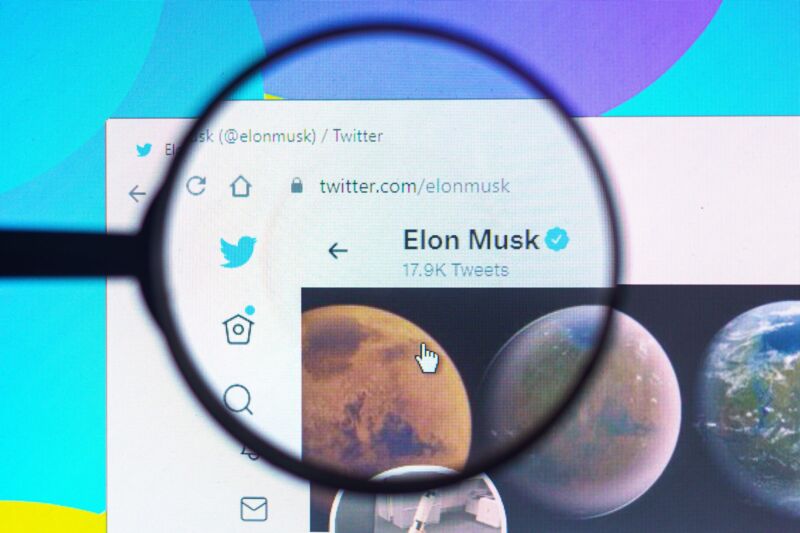
Getty Images
Elon Musk said he’s taking legal action against the creator of a Twitter bot that tracked his private jet, and he has changed Twitter’s rules to ban sharing of live locations in most scenarios.
Musk has completely reversed his pledge since November 6, when he wrote that his “commitment to free speech extends even to not banning the account following my plane, even though that is a direct personal safety risk.” As reported yesterday, the Musk-led Twitter suspended the ElonJet account that used publicly available data to track Musk’s plane and suspended the personal account of ElonJet creator Jack Sweeney.
The Twitter suspensions—which also affected other plane-tracking accounts run by Sweeney—occurred one day after Musk said a car carrying his son X AE A-XII was followed by a stalker. Revealing his plan to sue Sweeney, Musk wrote on Wednesday night:
Last night, car carrying lil X in LA was followed by crazy stalker (thinking it was me), who later blocked car from moving & climbed onto hood.
Legal action is being taken against Sweeney & organizations who supported harm to my family.
In the same tweet thread, Musk also described Twitter’s new policy on location sharing. “Any account doxxing real-time location info of anyone will be suspended, as it is a physical safety violation,” he wrote. “This includes posting links to sites with real-time location info. Posting locations someone traveled to on a slightly delayed basis isn’t a safety problem, so is ok.”
“Elon gave me no warning”
Sweeney, a student at the University of Central Florida, wrote on Facebook that “Twitter suspended all 30 of my Twitter accounts.” He also discussed his account suspensions in a Mastodon post. “Elon gave me no warning…. plus he suspended all of my accounts,” including those that don’t track specific people, he wrote. That includes bots tracking NASA planes, experimental aircraft, and weather planes, he wrote.
We asked Sweeney if he has heard from Musk or Musk’s lawyers about the threatened legal action and will update this article if we get a response. Musk didn’t provide any specific details about the legal action against Sweeney.
(Update at 2:18 pm ET: Sweeney told the New York Post that he thinks Musk’s threat of legal action is “a bluff” but “it’s hard to say… we’ll have to see if I get an official notice from anything.”)
The ElonJet account is still on other platforms, including Facebook, Instagram, Telegram, Truth Social, and Mastodon. The automated account uses flight-tracking data from ADS-B Exchange. Sweeney created similar bots tracking Bill Gates’ jets, Mark Zuckerberg’s jet, and Air Force One.
Twitter cites “increased risk of physical harm”
The official Twitter Safety account announced the updated policy about an hour before Musk’s tweets. “We’ve updated our Private Information policy to prohibit sharing someone else’s live location in most cases,” Twitter Safety wrote.
“When someone shares an individual’s live location on Twitter, there is an increased risk of physical harm. Moving forward, we’ll remove Tweets that share this information, and accounts dedicated to sharing someone else’s live location will be suspended,” the announcement continued.
There are several exceptions to the new rule. “You can still share your own live location on Twitter. Tweets that share someone else’s historical (not same-day) location information are also not prohibited by this policy. Content that shares location information related to a public engagement or event, such as a concert or political event, is also permitted,” Twitter wrote.
This week’s changes are detailed in Twitter’s updated private information and media policy. That policy previously hadn’t been updated since April. Under the heading, “What is in violation of this policy?” the following section was added:
Live location information, including information shared on Twitter directly or links to 3rd-party URL(s) of travel routes, actual physical location, or other identifying information that would reveal a person’s location, regardless if this information is publicly available.
“We define ‘live’ as real-time and/or same-day information where there is potential that the individual could still be at the named location,” the updated policy also says. The policy previously contained no mentions of “live locations.”
Automatic suspensions of location-sharing accounts
Suspensions of accounts similar to the ones Sweeney ran will be automatic, the updated policy says. “If your account is dedicated to sharing someone’s live location, your account will be automatically suspended,” it says.
Due to its various exceptions, enforcing the new policy may be complicated or at least require human review in many cases. One exception is “publicly sharing someone’s home addresses or live locations to seek help after a natural disaster.”
“Note: regardless of intent, if the information is not shared during a crisis situation to assist with humanitarian efforts or in relation to public engagement events, we will remove any tweets or accounts that share someone’s live location,” the policy says.
Tweets sharing live location information may be removed even if there’s no “abusive” intent. Under the heading, “What is not a violation of this policy?” the updated document includes “sharing information that is publicly available elsewhere, in a non-abusive manner (with the exception of live location information).”








